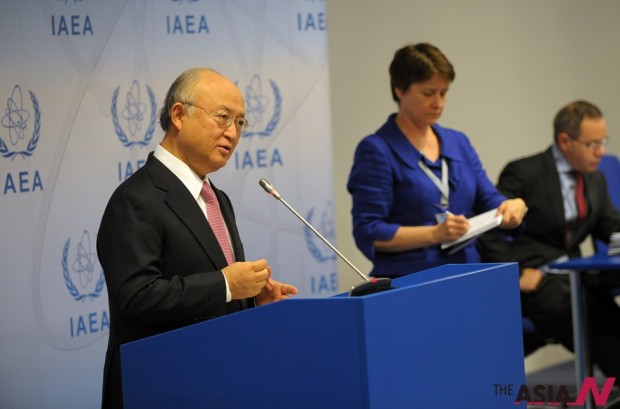UN inspectors to visit Arak heavy water plant in Iran, IAEA confirms

The International Atomic Energy Agency (IAEA) Director General Yukiya Amano (L) speaks at a press conference in Vienna, Austria, on Nov. 28, 2013. The IAEA accepted an offer from Iran to visit Iran's Arak heavy-water production plant early next month, IAEA Director General Yukiya Amano told a press conference here on Thursday. (Xinhua/NEWSis)
The International Atomic Energy Agency (IAEA) will accept an offer from Iran to visit Iran’s Arak heavy-water production plant early next month, IAEA Director General Yukiya Amano told a press conference here on Thursday.
Amano announced Iran’s invitation to visit the heavy-water plant in the central city of Arak on Dec. 8 in his statement addressing the IAEA Board of Governors.
Talking about possible increasing verification task under the Joint Plan of Action, reached between the P5+1 group and Iran in Geneva over the weekend, Amano said that the IAEA is considering how to put into practice the deal relevant to the agency.
The analysis, including the implications for funding and staffing, was a complicated task and needed proper preparations, he said, adding that it would take some time.
The P5+1 group, the five UN Security Council permanent members Britain, China, France, Russia and the United States plus Germany, and Iran have reached a first-step agreement on Iran’s nuclear program in Geneva.
According to the deal, Iran has been committed to halting enrichment above 5 percent and neutralizing its stockpile of near 20 percent uranium by means of dilution or converting.
Furthermore, the country has been committed not to installing more centrifuges, halting work at its plutonium reactor at Arak, and allowing inspectors from the IAEA daily access to its enrichment facilities at Natanz and Fordow.
The Arak facility produces heavy water for a nearby research reactor still under construction where Iran says it plans to make medical isotopes, though other nations such as Israel suspect that it may be able to produce weapons-grade plutonium.
The western states have long suspected Iran is developing its nuclear weapon program under the cover of a civilian atomic plan, which Tehran denies, saying it is solely peaceful. (Xinhua/NEWSis)





















































